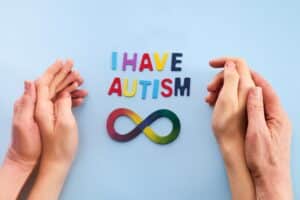Autism Spectrum Disorder (ASD) is a neurodevelopmental condition that affects individuals in varying degrees, with symptoms ranging from mild to severe. Raising ASD awareness is crucial in ensuring that autistic individuals receive the support and understanding they deserve in society.
Autism awareness helps inform the public about the challenges faced by autistic individuals, promoting acceptance and inclusion. Awareness campaigns, such as those during Autism Awareness Month, serve as platforms to educate people about autism spectrum disorders (ASD awareness) and the importance of early intervention and autism services.
Success Stories
“Move Up ABA has been a lifeline for our family. Before starting therapy, our son struggled with daily routines and communication. Now, he’s more independent and even initiated a conversation with a classmate for the first time! The progress we’ve seen in just six months is truly remarkable.”
- Emily R., Silver Spring, Accountant
“As a single dad, I was overwhelmed trying to manage my child’s behavior. The Move Up ABA team not only provided amazing support for my little girl but also taught me practical strategies to use at home. Their in-home sessions fit perfectly with our busy schedule. I’m so grateful for their patience and expertise.”
- Michael T., Rockville, Middle School Teacher
“We were hesitant about starting ABA therapy, but Move Up ABA’s approach put us at ease from day one. Our twins have made incredible strides in their social skills and self-regulation. The therapists are like extended family now, and we couldn’t be happier with our decision to work with them.”
- Aisha and James L., Simpson, Police Officers
Ready to start your child's journey to success? Schedule a free consultation today! 📞 Call (410) 497-8865.
World Autism Awareness Day: A Global Initiative

World Autism Awareness Day, observed on April 2nd every year, is a global event that aims to increase awareness about autism spectrum disorders. This day provides an opportunity for communities around the world to come together, support autistic people, and raise awareness about the importance of autism acceptance.
Today, organizations such as the Autism Society and advocacy groups highlight the need for better resources, improved autism services, and more inclusive practices in schools and workplaces. Celebrating World Autism Awareness Day fosters greater understanding and acceptance of autistic individuals and their unique needs.
Understanding Autism Spectrum Disorders
Autism Spectrum Disorders (ASD) encompass a range of conditions that affect social interaction, communication, and behavior. Autism symptoms can vary widely, with some individuals showing only subtle signs while others require significant support throughout their lives.
Early identification and intervention can significantly improve the outcomes for children with autism, helping them develop essential skills for life. By understanding the spectrum of autism and its impact on individuals, society can better support and accommodate autistic people.
Autism Advocacy: Empowering the Autism Community
Autism advocacy plays a vital role in promoting the rights of autistic individuals and ensuring they have access to the services they need. Advocacy efforts focus on raising awareness about the challenges faced by autistic people and pushing for policy changes to improve their quality of life.
By advocating for autism awareness and services, individuals and organizations work together to create a more inclusive world for autistic children and adults. These efforts help to raise awareness about the unique strengths and challenges of autistic individuals, leading to greater understanding and support.
Autism Awareness Month: A Time for Education and Advocacy
Autism Awareness Month, celebrated every April, provides an opportunity to focus on educating the public about autism. This month-long observance highlights the importance of supporting autistic children and their families through resources, services, and advocacy.
During Autism Awareness Month, many organizations, schools, and communities host events and campaigns to promote understanding of autism spectrum disorders. These efforts aim to reduce stigma and increase acceptance, encouraging people to embrace neurodiversity in all its forms.
The Role of Awareness Campaigns in Autism Advocacy
Awareness campaigns are essential in spreading knowledge about autism spectrum disorders and promoting autism acceptance. Through these campaigns, the public gains a better understanding of the challenges faced by autistic individuals, as well as the services and support available to them.
By participating in and supporting awareness campaigns, individuals contribute to the greater acceptance of autistic people. These initiatives help change perceptions, fostering an environment where autistic children and adults feel valued and supported.
Autism Symptoms and Their Impact on Daily Life

Autism symptoms can manifest in many ways, including difficulties with social interactions, communication, and repetitive behaviors. Understanding these symptoms is crucial for parents, caregivers, and professionals to provide the proper support for autistic children and adults.
The impact of autism on daily life can vary, with some individuals needing significant assistance while others live independently. By recognizing the symptoms of autism, society can provide tailored support to improve the quality of life for autistic people.
The Importance of Autism Services
Autism services, including early intervention programs, therapies, and educational support, are vital for helping autistic individuals thrive. These services address the unique needs of autistic children and adults, providing them with the tools they need to succeed in various aspects of life.
Access to quality autism services is essential for reducing the challenges associated with autism spectrum disorders. With proper services, autistic individuals can lead fulfilling lives, achieve their goals, and become active, contributing members of society.
Autism Acceptance: Moving Beyond Awareness
While raising awareness about autism is essential, it is equally crucial to promote autism acceptance. Autism acceptance involves embracing the differences of autistic individuals and recognizing their strengths rather than focusing solely on their challenges.
By fostering an environment of acceptance, society can better support autistic people and create a more inclusive world. Autism acceptance helps reduce stigma, ensuring that autistic individuals are treated with respect and allowed to reach their full potential.
Supporting Autistic Children and Families
Supporting autistic children and their families is essential for their well-being and development. Parents and caregivers often face unique challenges in meeting the needs of their autistic children, and providing resources and community support is crucial for their success.
Through programs, support groups, and autism services, families can receive the guidance and assistance they need to help their children thrive. Encouraging acceptance and understanding of autism helps create a supportive environment for children and their families.
The Importance of Early Diagnosis in Autism
Early diagnosis of autism spectrum disorder is crucial for providing timely interventions that can significantly improve a child’s development. The earlier the diagnosis, the sooner therapeutic services can be implemented to support social, communication, and behavioral skills.
Early intervention programs like speech and behavioral therapy help children develop essential life skills. By identifying autism symptoms early, families can ensure that children receive the support they need to thrive.
The Role of Families in Autism Awareness

Families play a central role in raising awareness about autism spectrum disorders by sharing their experiences and educating others. When families participate in awareness campaigns, they help to reduce the stigma surrounding autism and advocate for better support services.
By becoming active participants in the autism community, families contribute to a more inclusive society. Their efforts can inspire others to learn more about autism and encourage acceptance and understanding.
Creating Inclusive Environments for Autistic Individuals
Creating inclusive environments is essential for autistic individuals to thrive in schools, workplaces, and communities. This can include offering reasonable accommodations, such as quiet spaces or modified communication methods, to meet the needs of those with autism.
Inclusive environments help autistic people feel valued and accepted, enabling them to participate fully in society. These changes promote a sense of belonging and allow autistic individuals to showcase their strengths and talents.
Autism Awareness and the Media’s Role
The media plays a significant role in shaping public perceptions of autism, making it an essential tool in raising awareness. By accurately portraying autistic individuals and their experiences, the media can contribute to reducing misconceptions and stereotypes about autism spectrum disorders.
Through documentaries, television shows, and news coverage, the media can highlight the importance of autism advocacy and acceptance. This representation encourages more understanding and empathy from the public.
Building Autism-Friendly Communities
Building autism-friendly communities involves ensuring that public spaces, schools, and workplaces are accessible to people with autism. This may involve providing staff training, sensory-friendly accommodations, and meeting social and communication needs.
Autism-friendly communities foster an environment where autistic individuals are included and supported. By promoting these practices, communities can become more welcoming and supportive for people with autism.
Collaboration Between Autism Advocacy Groups and Schools
Collaboration between autism advocacy groups and schools is vital for creating supportive educational environments for autistic children. Advocacy groups provide valuable resources and training for teachers, helping them understand autism symptoms and the best ways to support students.
Schools that work closely with autism advocacy organizations can offer more inclusive programs that meet the needs of autistic students. This partnership helps to ensure that autistic children receive a quality education that promotes their strengths and abilities.
The Impact of Autism Research on Awareness
Ongoing research into autism spectrum disorder plays a critical role in improving our understanding of the condition and enhancing awareness efforts. Research helps identify new treatments, interventions, and educational strategies that can benefit autistic individuals.
By supporting and promoting autism research, society can continue to make progress toward better outcomes for autistic people. The findings from this research can inform public policy, education, and healthcare practices, leading to more effective support systems.
Emphasizing Autism Acceptance in the Workplace

Workplace inclusion is essential for autistic individuals to thrive professionally and contribute their unique talents. Employers who embrace autism acceptance create supportive environments that allow autistic employees to succeed.
By providing workplace accommodations, such as clear communication or flexible work schedules, employers can ensure that autistic individuals feel respected and empowered in their roles. This approach benefits both the employees and the organization as a whole.
The Power of Personal Stories in Autism Advocacy
Personal stories from autistic individuals and their families are potent tools in autism advocacy. These stories offer valuable insights into the challenges and successes of living with autism and help raise awareness by humanizing the condition.
By sharing these personal experiences, individuals can inspire others to learn more about autism and get involved in advocacy efforts. These stories can foster empathy and understanding and ultimately promote greater acceptance of autistic individuals in society.
Conclusion
Raising awareness and fostering acceptance of autism spectrum disorder is essential for creating a more inclusive and supportive society. Through continued education, advocacy, and community involvement, we can ensure that autistic individuals receive the respect, resources, and opportunities they deserve.
By promoting understanding and providing the right services, we can empower autistic children and adults to lead fulfilling lives. With collective effort and commitment, we can create a world where autism is embraced and every individual has the chance to thrive.





